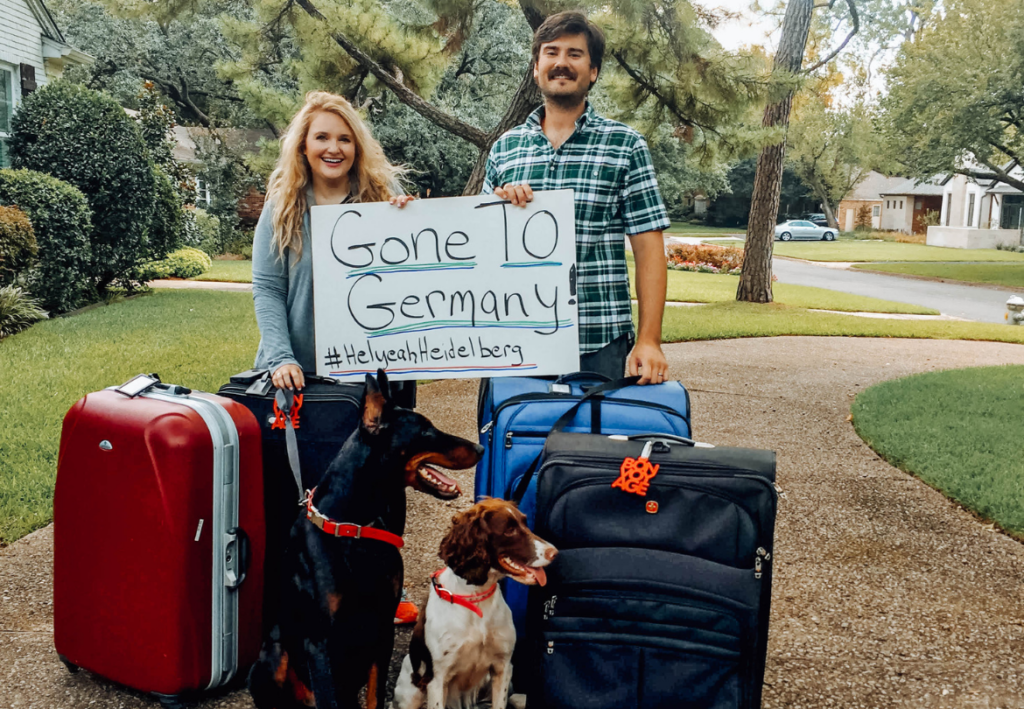There is just so much that goes into moving abroad. Much more than I even knew was possible. Even though we haven't left for Germany yet (and I thank everyone for their continued outpouring of support and kindness, especially after Monday's post). I haven't moved just yet, but I love seeing perspectives from others. Courtney of Courtney Leigh offered her unique perspective to my readers, and I couldn't wait to share. Here's her story:

Moving abroad was one of the most exciting yet terrifying experiences of my life. After college, I signed two contracts to teach English to middle and elementary school students in Daejeon, South Korea. I spent a total of a year and five months there. While preparing to leave, I was thrilled about the adventure, but part of me wondered if I could really move away from my family, friends, and comfort zone. In preparation for my trip, I scoured the Internet to hear the experiences of other expats, and I was ever grateful for any tips they provided. Now, I want to share some of my experiences and tips with you.
Let’s start with packing. I am from the Southeast region of the United States, and before traveling abroad, I had never experienced a winter that required more than what friends from up north would call a light jacket. I was not prepared for a Korean winter. Fortunately, a fellow expat friend who despised the cold as much as I do took me shopping. She taught me the secret to a complete winter outfit which included LOTS of layers.
Also, you will want to have a few comfort snacks from home. I appreciated these more than I imagined I would. There were days when I was sick of Korean food, and I longed for the taste of M&M’s or, being the Southern girl that I am, an ice-cold glass of sweet tea. My friends may have teased me about my sweet tea, but I didn’t regret taking my family sized black tea bags for a second.
Once you have your packing list, it is helpful to start learning some basics of the language. Personally, I would start with basic directional terms, most importantly, where, here, there, right turn, left turn, and straight. I found these words most helpful when I taking a taxi home and communicating where my building was when they all looked the same for blocks. Before I knew words for directions, I would sometimes get frustrated and find it easier to get out of the taxi early to walk to my destination.
Food terms are also important. Trust me; you want to know what kind of meat you are ordering. I also suggest learning the words for restroom, bus, subway, taxi, and numbers. And don’t forget please, thank you, and other courteous terms. They go a long way, and they can be communicated differently, depending on the culture. Also familiarize yourself with how and when to say them.
It is important to learn polite gestures of the surrounding culture, but I wouldn’t agonize too much over perfectly performing every social convention. It can become unnatural. For example, I had read it was impolite to hold eye contact in Korean culture, and my Korean friend had read that Americans show respect by maintaining eye contact. In our first conversation, I kept darting my eyes away from his face while I endured an intense, unflinching stare from my friend. Needless to say, it was uncomfortable for both of us.
Everything you experience will be different from home in some way. At first, the newness is exciting. You encounter exotic food, music, art, architecture, and nature. Be sure that while you are taking it all in, you don’t forget to start making expat friends. They will be your lifelines while you are away from home. On days when the excitement wares off, they will be the ones you turn to most. To meet other expats, you can take local language classes, find an area of town that is known as the “foreigner” (that’s you) district, or search the Internet for “expats in [insert your country here].” They want you to find them because they know how much you need each other. I met my closest expat friends at an English-speaking church in Daejeon. We explored the country, became experts in noraebang (small karaoke room you can rent), and took Korean lessons together. On tougher days, we vented frustrations to each other and shared experiences that reminded us of home.
Don’t get me wrong. Most days were amazing, but then, there were days when I was severely homesick. I was experiencing culture shock, and you can expect to experience it too. I was irritated by every little thing around me that wasn’t like home. I was tired of people walking in all directions instead of the right side of the sidewalk. And could I please have some personal space on the bus?! It could even be the smell of local food or hearing the local language that irritate you most. It’s important to be aware of what culture shock is and that it will pass. You may feel silly for being extremely annoyed at little things, but it is normal.
Everyone copes with culture shock differently. I would usually scout out a good burger and fries and laugh over an American romantic comedy with my expat friends. I didn’t push myself to be adventurous on those days because it just made it worse. I knew it wouldn’t be long before I loved my new surroundings again though.
By the end of my first contract, I felt pretty comfortable living in South Korea. I knew there was so much I would miss, but I was also excited to be surrounded by people who thought and acted like me again. However, when I arrived home, I didn’t feel as comfortable as I expected. I was introduced to reverse culture shock, a common experience when you return home. I had been in another culture so long that I had forgotten the gestures that were once subconscious to me. I noticed it most one night when I went out for my favorite hobby—swing dancing! A few songs in, I realized, that I had forgotten how to “play the game” to be asked to dance. I avoided eye contact, as a respectful Korean would, and I had to retrain myself to make eye contact without seeming really awkward or incredibly intense. I learned that on days when I felt out-of-place at home, it was helpful to head to a local Korean barbecue restaurant where I could reminisce about my experience. Don’t worry though. It doesn’t take long to get back into the groove of your normal daily life at home.
These were my experiences, but everyone has their own way of adjusting to new cultures and readjusting to home. Now that you’ve read about my time abroad, in what ways have you learned to deal with culture shock?
Courtney is a blogger at Courtney Leigh. She is a new wife and rescue dog owner that takes on tough subjects. She aims to spark conversation about diverse perspectives, and her writing focuses on topics related to Christianity and culture. Find her on Twitter @courtneylblog.















